Trump says US must make deal with Iran
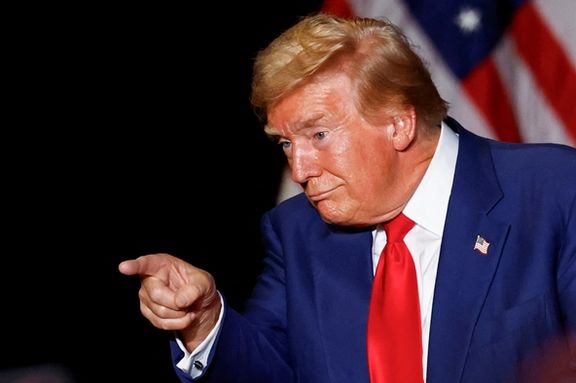
US Presidential candidate Donald Trump on Thursday said Washington must come to an agreement with Iran, in a seeming departure from his hardline stance toward its main adversary in the Middle East.

US Presidential candidate Donald Trump on Thursday said Washington must come to an agreement with Iran, in a seeming departure from his hardline stance toward its main adversary in the Middle East.
Asked by reporters whether he might be receptive to reviving negotiations with the Islamic Republic over its disputed nuclear program, Trump said a deal was essential.
“Sure, I would do that,” Trump said. “We have to make a deal, because the consequences are impossible. We have to make a deal.”
Trump, a business mogul, has repeatedly expressed his preference for deals with Washington's opponents but his comments come as tensions in the Mideast have ramped up and his campaign said Iran has made threats on his life.
Earlier this week, Trump's campaign said US security agencies had briefed him on threats to the former president's life.
The Islamic Republic is outspoken in reviling Trump after he authorized the assassination of one of its top military commanders in Iraq in January 2020 and after his administration pulled out of an multilateral nuclear deal with Iran inked by his predecessor.
Trump said on Wednesday that the United States should threaten to bomb countries "to smithereens" which seek the assassination of US leaders in the wake of the alleged Iranian plot.
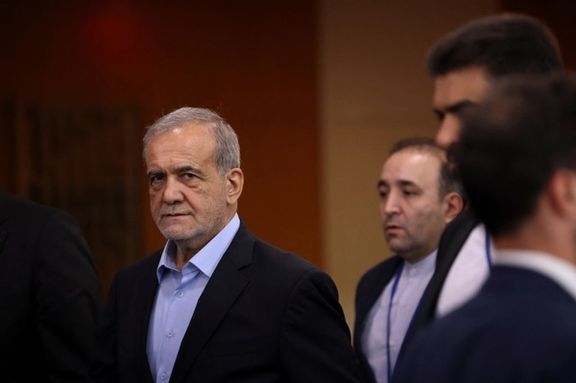
Concluding his three-day visit to New York, Iranian President Masoud Pezeshkian announced that discussions on the nuclear deal with European countries will be revisited soon.
"It was also decided to hold a meeting in Europe. We discussed the JCPOA (Joint Comprehensive Plan of Action). We expressed our concerns to Europe, and it was agreed that the foreign ministers would review this matter again," Pezeshkian told domestic reporters at the Tehran airport on Thursday.
The Iranian President also took a moment to blame the US for "tearing up" the agreement -- claiming that most of the European leaders were "upset about it."
The Joint Comprehensive Plan of Action (JCPOA), signed in 2015 between Iran and world powers, sought to limit Iran's nuclear activities in exchange for sanctions relief. However, in 2018, then-US President Donald Trump withdrew from the agreement, citing concerns that it did not address Iran’s missile program.
Pezeshkian also appeared to emphasize the Iranian state's goal to "resolve" the nuclear issue through "dialogue."
Attempts to revive the deal over the years have seen indirect talks, with European diplomats often mediating between US and Iranian officials, though these efforts have largely failed.
In August, Iran’s Foreign Minister declared the JCPOA "beyond revival," stating, "Under the new government, our focus is not on restoring the nuclear deal but on lifting the sanctions."
Despite this, President Pezeshkian has shown a desire to re-engage with Western powers, pledging to work towards reviving the agreement and lifting the sanctions imposed following the US withdrawal. The country's Supreme Leader, Ali Khamenei, opened the door to future talks in August.
In his first press conference in Tehran, Pezeshkian reiterated that Iran is not seeking nuclear weapons but is instead focused on fulfilling its scientific and technical needs. He stressed Iran’s continued adherence to the JCPOA framework, stating, "By tearing up the JCPOA, the West forced us into actions we did not intend to take. If they don't continue, we won’t either. If they uphold their commitments, we will fulfill ours as well." During his speech at the UN General Assembly (UNGA), Pezeshkian also expressed Tehran's readiness to negotiate with JCPOA partners.
However, doubts remain over the future of the deal. French President Emmanuel Macron said on Monday that he does not believe any new proposals can revive the nuclear agreement in the near future.
Speaking on France Inter radio, Macron cautioned, "I would still be very cautious. I don't think there will be new proposals right now to save the nuclear deal." He added that the political situation in Iran, where widespread protests have erupted, has "changed the situation a lot" and further weakened the chances of reaching a new agreement.
Western powers have also expressed concerns over uranium traces found at three sites in Iran. Last week, they stressed that it is "essential and urgent" for Iran to provide explanations. Iran has agreed to a visit from the UN nuclear watchdog this month to address these concerns. However, another unresolved issue involves Iran’s refusal to allow several UN inspectors access to its nuclear sites.
In June, the IAEA’s 35-nation Board of Governors passed a resolution calling on Iran to increase cooperation and reverse its barring of these inspectors, technically referred to as "de-designation." Despite this, Rafael Grossi, head of the IAEA, confirmed in a recent interview that Iran’s government has refused to lift the ban. "They won’t do that," Grossi said. "As I said to one of your colleagues, that ship has sailed."
Meanwhile, in July, the White House National Security Council spokesperson indicated that the Biden administration is not prepared to resume nuclear negotiations with Iran under its new administration.
In an interview with Tehan-based Entekhab, international relations expert Rahman Ghahramanpour expressed a nuanced view on the prospects of negotiations with the US. He noted, "At present, the chances of open, direct, and comprehensive negotiations with the US are slim, but this does not mean that negotiations will not occur." Ghahramanpour further remarked that both sides seem to have agreed to engage in discussions on the nuclear issue at a lower level, with hopes of a more favorable environment emerging after the US presidential elections.
He also suggested that the resumption of talks with Europe will likely be approached with "medium priority," citing the fact that Deputy Foreign Minister Majid Takht Ravanchi is leading the upcoming meeting with France.
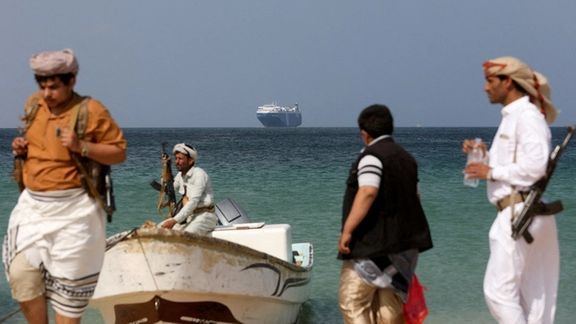
Yemen's Houthi group has grown into a "powerful military organization" due to significant support from Iran's Revolutionary Guards, Hezbollah, and Iraqi experts, according to a confidential UN report seen by Reuters.
The report indicates that foreign military aid has significantly enhanced the Houthis' capabilities, allowing them to play a more prominent role in regional conflicts.
Independent UN experts, who report annually to the UN Security Council, observed that Houthi fighters have received advanced tactical and technical training outside of Yemen.
Houthi operatives, using fake passports, have traveled to Iran, Lebanon, and Iraq to hone their military skills. These efforts have enabled the group to execute more complex operations, such as drone and missile strikes in key areas like the Red Sea.
On Tuesday, Reuters also reported that Iran has been assisting in organizing secret talks between Russia and Yemen’s Houthi militia. The aim is for Russia to supply the group with advanced anti-ship missiles. Two regional officials confirmed that representatives of the Houthis and Russia have met in Tehran at least twice this year to discuss these missile deliveries.
Despite a UN arms embargo on the Houthis since 2015, the report emphasized the significant amount of foreign assistance they continue to receive.
"Multiple testimonies from military experts, Yemeni officials, and individuals close to the Houthis indicate they lack the capability to develop and produce complex weapon systems independently," the UN experts wrote.
"The scale, nature, and extent of the military equipment and technology being transferred to the Houthis from outside sources, along with financial support and training, is unprecedented."
The report also noted that the weapons used by the Houthis resemble those produced by Iran or members of the so-called Axis of Resistance, a coalition of Tehran-backed organizations opposed to Israeli and US influence in the Middle East.
This transformation is largely attributed to the support of the IRGC-QF (Quds Force), Hezbollah, and Iraqi experts, who have provided the Houthis with training and material assistance.
The conflict in Yemen has become a central issue in the broader regional crisis. As the war in Gaza continues, the Houthis have intensified their blockade of the Red Sea, targeting commercial vessels under orders from Iran's Supreme Leader Ali Khamenei.
What began in the Red Sea has now spread to the Arabian Sea. These attacks have severely disrupted global shipping and led to the capture of several foreign sailors uninvolved in the Israel conflict.
In response, a US-led coalition of over 20 nations has mobilized to protect global trade routes and ensure the safety of maritime traffic in these crucial areas.
Iran’s influence in the region extends beyond Yemen. In early September, the Houthis launched a missile into central Israel for the first time, striking an area near Ben Gurion International Airport.
The attack, which the Houthis claimed involved a hypersonic missile, caused no injuries but marked a serious escalation. Israeli Prime Minister Benjamin Netanyahu warned that Israel would impose a "heavy price" on the Houthis.
Meanwhile, Iranian President Masoud Pezeshkian, in his first press conference since his election, denied that Tehran has supplied hypersonic missiles to the Houthis or short-range ballistic missiles to Russia, reiterating Iran’s position that it does not provide direct military support to the group.
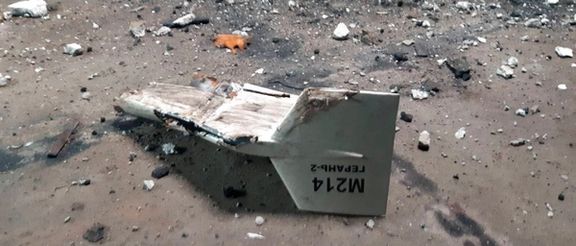
German Foreign Minister Annalena Baerbock urged the Iranian state to end its support for Russia in the Ukraine war and stop exporting weapons during talks with Iranian Foreign Minister Abbas Araghchi on Wednesday.
In a meeting held on the sidelines of the United Nations Security Council in New York, Germany’s top diplomat called on Tehran to stop exporting ballistic missiles and drones.
In a statement on its X account, the German Foreign Ministry also noted that the discussions with Araghchi addressed "concerns about the Iranian nuclear program and Germans imprisoned in Iran."
The same day, Australia’s Foreign Minister Penny Wong posted a picture of her meeting with Araghchi, saying she had raised concerns about “human rights and Iranian-Russian military cooperation.”
These diplomatic talks come as the US and the UK formally accused Iran earlier this month of supplying short-range ballistic missiles to Russia for use against Ukraine, leading to a fresh wave of sanctions on both Moscow and Tehran.
The European Union has similarly imposed sanctions on Iran over its missile transfers, in addition to those already in place due to Tehran's nuclear activities and human rights abuses.
“We call on Iran to immediately cease all support to Russia’s war against Ukraine and halt the development and transfer of its ballistic missiles,” France, Germany, and the UK said in a joint statement. US Secretary of State Antony Blinken echoed this sentiment, warning that Iran’s actions represented a "profound escalation" of the war.
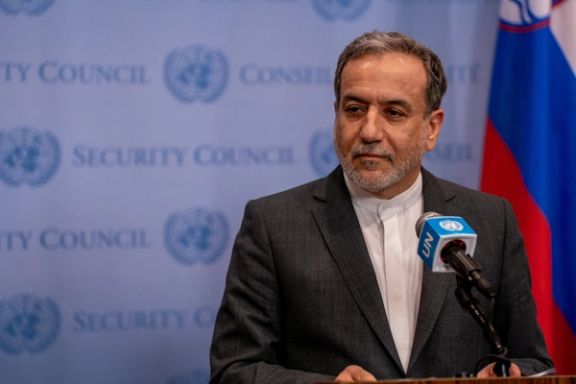
Blinken revealed that dozens of Russian military personnel had been trained in Iran to operate the Fath-360 close-range ballistic missile system, which has a range of up to 120 kilometers (75 miles).
"Russia has now received shipments of these ballistic missiles and will likely use them within weeks in Ukraine, against Ukrainians," Blinken said in early September, emphasizing that the supply of Iranian missiles allows Russia to target more distant locations while conserving its own arsenal for frontline engagements.
Iran has previously supplied Shahed drones, widely used by Russia in Ukraine, but has denied providing ballistic missiles.
Iranian Foreign Ministry spokesperson Nasser Kanaani dismissed reports of missile transfers as "ugly propaganda" meant to distract from Western military aid to Israel.
A Russian cargo ship, suspected of carrying Iranian ballistic missiles intended for Moscow's war against Ukraine, was observed at a Russian port on the Caspian Sea about two weeks ago, according to satellite imagery shared with CNN.
Additionally, Russia has used Iranian Shahed drones, extensively in large-scale attacks on Ukrainian infrastructure and civilian targets, often in combination with cruise and ballistic missiles, which have overwhelmed Ukraine’s air defenses.
Iran’s Foreign Minister, meanwhile, denied the assertions, accusing Western nations of acting on "faulty intelligence and flawed logic."
Iranian President Masoud Pezeshkian, in his first press conference, also denied any involvement in missile deliveries to Russia.
Responding to a question from a Japanese journalist, Pezeshkian said, "As for the relationship between the Islamic Republic and Russia, I can say with certainty that since we took office, we have not provided them with anything."
While Pezeshkian expressed no knowledge of missile transfers under his predecessor, Ebrahim Raisi, or previous administrations, he affirmed, "We have and will continue to have relations with Russia."
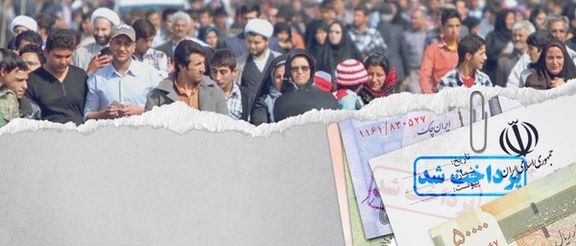
The Iranian state’s sprawling military, state-owned banks, and companies dominate about 80% of the economy, creating a system where many citizens depend on public sector jobs.
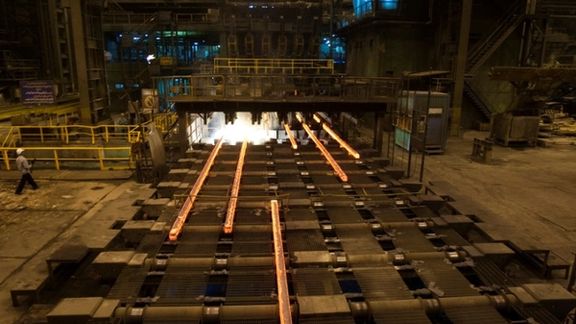
Iran's crude steel production last month declined to 1.4 million tons, which is less than half of the country's monthly nominal steel production capacity.
This summer, Iran faced a 25% power deficit, severely limiting electricity supply to industries, including steel mills, which are heavily dependent on electrical power.
The sharp decline in steel production during the hot season is due to power shortages, a situation mirrored in winter months when gas shortages also lead to significant drops in production.
Iran's power and gas deficits have been worsening dramatically each year. Last summer, the country's electricity shortage reached 11,000 megawatts, rising to 20,000 megawatts this year. Additionally, Iran faced a gas deficit of 250 million cubic meters per day last winter, amounting to 25% of its winter demand.

The trend in declining production is undeniable. Data from the World Steel Association reveals that Iran's steel production in August dropped by 9.9% compared to the same month last year, 33% compared to August 2022, and a sharp 44% compared to August 2021.
Due to reduced operations and under-capacity production this summer, Iran’s crude steel factories have incurred an estimated opportunity cost of $1.5 billion, based on average global steel prices.
The sharp decline in crude steel production has also taken a toll on steel-dependent industries, particularly automotive manufacturing, which saw a 15% drop in production this summer. With a monthly capacity of 120,000 vehicles, the economic loss from this significant downturn in the automotive and parts sectors is substantial.
Additionally, a sharp drop in cement production this summer, also caused by power shortages, has doubled cement prices and halted construction projects across the country.
So far, economic and industrial authorities in the Islamic Republic have not released a report detailing the overall losses incurred by the country’s industries due to the significant electricity and gas shortages. However, some internal estimates, reflected in Iranian media, suggest that last year’s energy shortages cost the country about $8 billion.
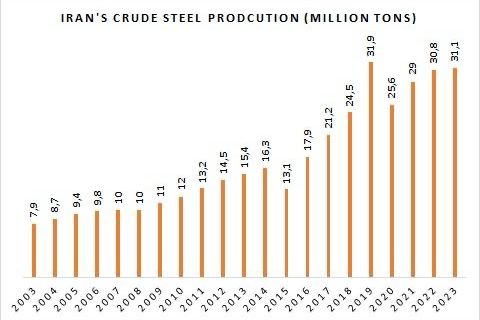
Several organizations in Iran's power industry warned earlier this month of a 26,000 MW electricity deficit next summer, exceeding 30% of peak demand, compounded by natural gas shortages affecting both industries and households.
Ali Nikbakht, Chairman of the Iran Power Plants Association, has highlighted the aging and deterioration of a large portion of the country’s power plant infrastructure. He revealed in September that a major power plant has already ceased operations for repairs, noting, “The necessary spare parts should have been ordered two years ago, but they weren't, further worsening the electricity shortage.”
The steel industry plays a crucial role in Iran’s economy, contributing approximately $8 billion and representing 16% of the country’s total non-oil exports. As one of Iran’s most vital industrial sectors, it has been a rare success story over the past two decades, expanding from an annual production of 8 million tons to over 31 million tons.
Data from the World Steel Association indicates that Iran produced 19.8 million tons of crude steel in the first eight months of the current year, a significant portion of which was produced in spring—a season with fewer power and gas shortages.
Iran’s steel production grew rapidly from 2015 to 2019, a result of the nuclear agreement known as the JCPOA (Joint Comprehensive Plan of Action) with world powers, and the widespread inauguration of new steel plants across the country. However, in 2019, following the imposition of US sanctions on Iran's steel exports, the industry experienced a sharp decline.
Over 60% of Iran's steel exports go to Iraq and the UAE. Since 2021, Iran has managed to find ways to circumvent US sanctions on its metals industry, leading to a recovery in production and exports. However, the country's steel output has not yet returned to its 2019 peak levels.